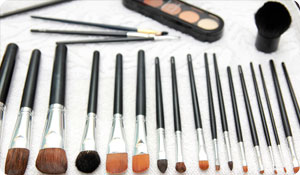
Can't remember the last time you cleaned your makeup brushes? That's probably because either you've never done it (guilty!) or haven't gotten to it in a while.
There are some legitimate reasons to give those brushes a thorough sudsing. Truth be told, makeup brushes can become coated with undesirable elements such as bodily oils, makeup residue, dust, and dead skin and will last longer with regular cleaning. Using clean brushes are better for your skin (especially if it's acne-prone) and will also give you better results.
For these reasons and because makeup can be inadvertently contaminated with airborne bacteria, experts recommend giving them a thorough cleaning at least once a week. If that sounds like a lot of maintenance, it's really not. We're not talking disinfecting the bathroom, here. Cleaning makeup brushes is quick and easy—no heavy lifting required—and doesn't require any special products either. In fact, you probably have what you need to do the job already on hand.
Basically, any gentle shampoo (think Johnson's® baby shampoo) will do. Pour a small amount into a plastic cup, add a little water to dilute and make circular motions with the makeup brush until foam forms. Remove the brush and use your fingers to work the shampoo through the bristles. Making sure the brush is pointing down into the sink, rinse with water until the water runs clear. Gently squeeze the bristles to remove any excess water being careful to avoid getting water into the brush handle as it can affect the glue.
A solution of vinegar and water (two parts water, one part vinegar) also works well.
Wipe damp brushes back and forth on a clean paper towel or washcloth and lay them flat to dry. Do not stand brushes upright to dry. Again, drying the brush with the bristles pointing toward the ceiling may result in water seeping into the handle and damaging the glue. Never use a hairdryer to hasten the drying process. Excessive heat can damage the glue and bristles, too.
Can't be bothered cleaning one more thing in your house? There are inexpensive commercial brush-cleaning sprays available at salons, drug stores, and online. To use, spray product on a tissue or directly on the bristles. Spray-on cleaners are especially handy when using the same brush with multiple products or different colors.
Makeup Safety Tips
Unclean brushes aren't the only things that can contaminate your skin and your makeup. Fortunately, makeup is formulated to fight bacteria, but over time it can lose that ability.
Here are some tips from the Food and Drug Administration to help you reduce the risk of contamination:
Practice good hygiene. Always wash your hands and face before applying makeup—especially before applying eye cosmetics. Though rare, bacteria from your hands can get into the eyes and cause an infection. Eye infections are painful and may damage your vision.
Discard mascara two to four months after opening it. Never use saliva or water to moisten dried-up mascara. Bacteria from your mouth (or in the water) can grow inside the mascara tube. Makeup remover—or good ol' soap and water—can be used to clean the mascara wand.
Don't store cosmetics at temperatures greater than 85°F. Hot temperatures can deteriorate the preservative in the makeup that fights bacteria growth. Toss any makeup left in a hot car.
Replace makeup frequently. Eyeliner, eye creams, and face creams should be replenished every six months. Liquid cosmetics, like foundation, should be replaced at least every year. Lipsticks and pencils last longer though and can be used up to two years. Powdered products like eye shadow are the longest lasting cosmetic products—up to three years.
If you notice any change in vision—especially blurred vision—or have pain or discharge from either eye, you may have an infection. Call an eye doctor immediately.
Sources:
The Food and Drug Administration
http://www.FDA.gov
University of Rochester Medical Center
http://www.urmc.rochester.edu





